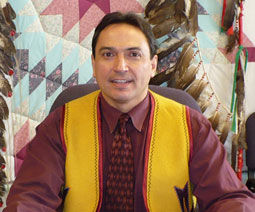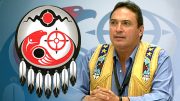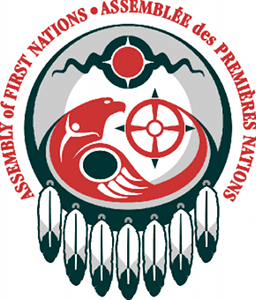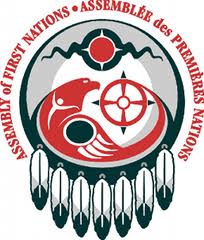Assembly of First Nations National Chief Perry Bellegarde gave a powerful keynote address to open the AFN Annual General Assembly on June 7, 2015. The text of his address follows:
Tawaw kahkiyaw,
okimâwak, nâpewak, iskwewak, kêhtêak, oskâyak. Okimaw piyisiw awasis nitisihkason. Miyo kisikaw anoch.
It is now 6 months into my term as National Chief and the first time we are gathering since that election. I want to thank all of you once again for your support and the honour you have given me.
We are at an historic time in our history. For decades our people have struggled to attain the same quality of life that other Canadians enjoy, and despite the great efforts of many. We are at an historic time in our history. For decades our people have struggled to attain the same quality of life that other Canadians enjoy, while Treaty commitments remain unfulfilled and fundamental rights ignored
Despite not one but two apologies from the Federal Government and a multitude of promises to make things better, commitments in Treaties and modern Treaties go unmet. We continue to face educational systems which ignore our languages, our histories, our knowledge systems and our values.
But today as we gather together to chart a course forward, we can feel the change that is coming, that we and our ancestors and Elders have worked so hard for. The change that our young people crave and deserve.
The Interim Report of the Truth and Reconciliation Commission captured the attention of Canadians and the world at large. For the first time, the term “cultural genocide” was used and people across the land learned what the words “Residential Schools” really meant.
And make no mistake: this was cultural genocide, part of a long, terrible and tragic history to remove Indians and Indigenous identity from these lands – our lands.
Justice Sinclair called it cultural genocide.
The Chief Justice of the Supreme Court of Canada calls it cultural genocide.
Many other are using the term, a harsh but necessary acknowledgment of our history.
As thousands of brave people shared their experiences and spoke the truth, Canadians woke up to a chapter of their history that must be forever remembered.
The legacy of the residential schools does not end with the suffering and the damage done throughout more than 100 years of abuse. No.
Because with the promise of reconciliation comes an opportunity to rebuild this country in the manner our ancestors envisioned.
Reconciliation means nothing less than keeping the promises the Government of Canada first made to our people to share and live together in peaceful co-existence and mutual respect.
Reconciliation means honouring those original promises. We must restore that original relationship to one based on respect. Partnership. And sharing the wealth of this land
Governments must respect our right to determine what happens in our traditional territories. So too, must they respect and share in our commitment to Mother Earth to care for our lands and waters.
Reconciliation means the Government must honour its legal duty to consult and accommodate First Nations peoples. The way forward will be found through free, prior and informed consent, government-to-government, replacing the patriarchal imposition of governance without our involvement.
Reconciliation means that governments in Canada must make Indigenous languages official languages of Canada, the provinces and territories. And we must have the financial resources for revitalization programs, immersion programs in schools and community-based efforts.
We will not be the generation that stands by and watches our languages disappear.
Reconciliation means continuing to push for the National Public Inquiry into Missing and Murdered Indigenous Women and Girls.
Reconciliation involves all Canadians. Just as all Canadians are learning the truth of our shared past, we ask that all Canadians appreciate the great potential that comes with Reconciliation.
A Canada that rights these wrongs and sets us on a path to the future our ancestors envisioned is a stronger, more vibrant, more prosperous Canada. With justice and respect and healing will come strength, and fulfilment and the ability to lead healthy lives.
With Reconciliation comes an ability to contribute our talents, our ingenuity and our unique knowledge and understanding of this land.
Canadians are known the world over as a fair and welcoming people. Canada is a diverse country that welcomes other cultures. A champion of human rights and peaceful coexistence. These are the values that Canadians cherish.
I believe Canadians want their political leaders to do the right thing when it comes to healing the rifts with First Nations peoples. And as Canadians consider their future in this election year, it is essential that we capture their imagination, and share with them what strong and healthy First Nations peoples will mean for this country.
We will make progress when more Canadians realize that First Nations being lifted out of poverty, empowered to deliver our own education, living in healthy homes with clean water and the same basic health care that all Canadians enjoy, when more Canadians see that this ends the cycle of poverty, and abuse, and violence, and alcoholism and incarceration – when more Canadians embrace our ancestors’ vision and say, enough!
Then, we will have a government that takes action and makes progress on the Reconciliation we await.
Throughout this meeting we will be joined by other national leaders. People like David Suzuki.
Thomas Mulcair, Justin Trudeau and Elizabeth May. People who have made commitments to work with us to realize this future. And people like the Right Honourable Paul Martin, people who commit to the change that is needed.
To these leaders I say: Thank you for your support. Thank you for standing with us. But there is much, much more work to do. We need to Close the Gap. Now.
And I ask you to join us by lending your voice to our call for action. Now.
Chiefs, I ask you to reach out to other leaders in your communities and seek their support. The mayors and reeves, environmental activists, the young people, Elders and builders, business people, church groups. We need their support. We need their voices to join ours. We need their leadership to build a chorus of Canadian voices demanding change once and for all.
Now, you cannot talk about Closing the Gap without talking about funding. First Nations leaders have been challenged to provide the basic social services all Canadians enjoy because we have been consistently and chronically underfunded when compared to the provinces providing those same services.
I am talking about the 2% cap. What is the 2% cap? The 2% cap is the now 20 year old ‘temporary’ measure on AANDC funding to First Nations. The 2% cap is the cap on financial resources for quality housing, clean drinking water and schools for our young people. The 2% cap is the cap on Canada’s potential that forces us to administer our own poverty. And I know that you know that.
As National Chief, I believe that Canada has an obligation and a self-interest in lifting the 2% cap. And I believe that Canada has an obligation for significant one-time investments to get First Nations to the starting line. And I will do my part to promote the lifting of the cap and securing these much needed investments. Investments in housing, clean drinking water and schools.
But we must all do our part.
Chiefs, I know that you will do so. We are heading into a federal election on October 19th. I am committed to doing all that I can to influence the federal parties’ platforms. I have already spoken at the NDP and Liberal party caucus meetings. I told them about the fundamental, essential need to remove the 2% cap and create a new fiscal arrangement. I am willing to speak to whomever is willing to listen. I cannot do this alone. It’s going to take our strong collective voice to do this.
And I want us to mobilize the vote.
We can make a difference in at least 51 ridings. 51.
We are already a strong factor in the upcoming election.
Mobilizing the vote starts with making sure that all of our people have their identification in place.
Influencing the party platforms matters too. We know that the federal candidates will be out on the barbecue circuit this summer. I hope to see you in some of their photos, influencing the platforms.
Now is the time for change. Now is the time to close the gap. Now is the time to embrace the new era of reconciliation.
When our children live in quality housing and go to quality schools grounded in their languages and cultures, when they have the same access to health care that all Canadian children do, then all of Canada wins.
Together, in unity and strength, we will make a difference.
We can Close the Gap. Please join me on this journey






Be the first to comment on "AFN Chief urges leaders to mobilize their voters for the upcoming federal election"